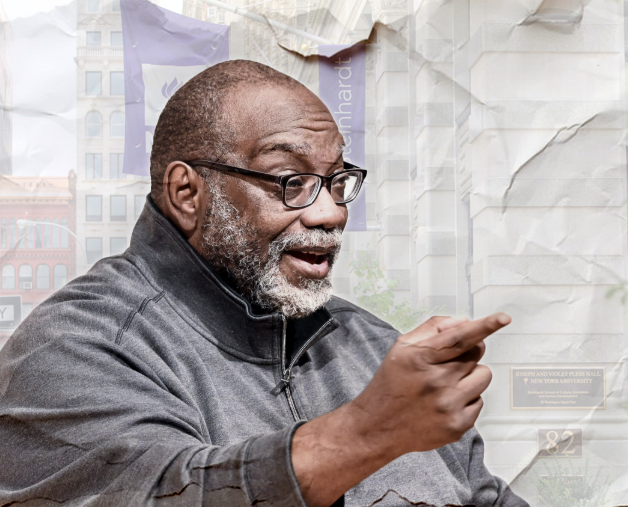Fred Moten, a celebrated Professor of Performance Studies and poet, has quietly become one of the most influential figures embedding pro-Hamas extremism into elite cultural and university spaces. Under the banner of “poetics” and “theory,” Moten pushes narratives that demonize the Jewish state, normalize terrorism, and reframe violent uprisings as acts of artistic resistance. From documentary films to classroom lectures, Moten has constructed a sanitized framework through which antisemitism is repackaged as intellectual critique; and students are drawn into ideological militancy under the guise of progressive scholarship.
Endorsing Terror-Affiliated Movements
Moten’s activism is not limited to words or theory. He has directly aligned himself with organizations and individuals associated with terrorist groups. In doing so, he helps whitewash the violent records of extremists, presenting them as cultural or political martyrs, and erases the distinction between resistance and terrorism.
- Signed the Khalida Jarrar Solidarity Statement in support of a senior member of the Popular Front for the Liberation of Palestine (PFLP), an internationally recognized terrorist organization responsible for suicide bombings and attacks on civilians.
- Supported the “Strike MoMA” campaign, which targeted Jewish board members and cultural institutions linked to Israel, amplifying rhetoric common among far-left networks that rationalize violence against Jews as “anti-colonial struggle.”
- Participated in the documentary The Coming Intifada, which glamorized Palestinian uprisings and included scenes with Khader Adnan, a spokesman for Palestinian Islamic Jihad (PIJ), another designated terror organization.
By lending his name and presence to these projects, Moten helps legitimize violent ideologies, positioning them as part of a broader cultural conversation, when in fact they’re grounded in hate.
Leading the Charge for Academic Boycotts and Anti-Zionist Campaigns
Moten has played an active role in efforts to isolate Israel from the academic world. But this is no mere policy disagreement, it’s a campaign to delegitimize the Jewish state’s very right to exist. His work within professional organizations, and the statements he’s signed, push for total disengagement with Israeli scholars and institutions.
- Longtime endorser of the U.S. Campaign for the Academic and Cultural Boycott of Israel (USACBI), the intellectual arm of the global BDS movement.
- Helped launch boycott efforts through MLA Members for Justice in Palestine and endorsed boycotts while affiliated with the American Studies Association (ASA).
- Regularly frames Israel’s existence as rooted in “racism, settler colonialism, and state violence,” arguing it should not be defended as a legitimate state.
- Has stated: “The defense of Israel’s existence is a defense of the nation-state’s right to exist,”
implying that Zionism itself is inherently invalid. This type of rhetoric goes far beyond critique, it aligns with definitions of antisemitism that equate denial of Jewish self-determination with hate.
Embedding Hate Through Cultural Production
Moten uses art, theory, and abstract language to mask the extremism of his message. By cloaking propaganda in academic and poetic terms, he avoids the scrutiny typically applied to political figures while injecting dangerous ideas into elite cultural spaces.
He doesn’t shout slogans—he whispers them through literature, performance, and classroom theory.
- Framed Zionism as racism, Israeli sovereignty as “settler colonialism,” and Jewish history as a myth of power.
- Refers to BDS and cultural sabotage as acts of “militant love,” normalizing hostility under the pretense of moral resistance.
- Co-produced The Coming Intifada, a film that glorifies violent struggle and erases the line between insurgency and terrorism.
- Has celebrated radicals like Mohammed El-Kurd and lent legitimacy to events that platform BDS ideologues and terror supporters.
His influence has helped turn art departments and humanities programs into ideological incubators where resistance is not just studied, it is rehearsed.
Radicalizing the Classroom and Academic Discourse
As a professor at NYU’s Tisch School and formerly at UC Riverside, Moten has had direct influence over generations of students. His teachings fuse anti-Zionist ideology with identity politics, leaving little room for dissent. In his hands, theory becomes a weapon—not a tool for truth.
- Teaches “Black study” and “poetics” through a lens of radical deconstruction, consistently incorporating anti-Zionist themes.
- Promoted BDS and praised Palestinian organizers for launching the movement.
- Regular speaker at Learning Palestine, AMP, and other BDS-aligned groups that promote revisionist histories and one-sided attacks on Jewish identity.
- Co-authored The Undercommons, a widely circulated radical text that glorifies resistance as disruption—a philosophy now used to justify lawlessness in the name of justice.
By fusing critical race theory, postcolonialism, and anti-Zionism, Moten constructs an ideological worldview where Jews are cast as colonizers and resistance—no matter how violent—is elevated as virtue.
A Threat to Campus Safety and Intellectual Integrity
Fred Moten’s work is not simply controversial, it is corrosive. It encourages the erasure of Jewish identity, delegitimizes the existence of the Jewish state, and creates an environment where students are praised for rejecting dialogue in favor of dogma. His cultural prestige has insulated him from accountability, but his impact is anything but abstract.
- Mainstreams the ideology of terror-linked organizations in elite university settings.
- Uses art and poetry to embed antisemitic conspiracies under the radar of traditional academic scrutiny.
- Radicalizes students into viewing Jewish history, statehood, and peoplehood as inherently oppressive.
- Transforms NYU’s reputation into a platform for justifying violence and isolating Jewish voices.
Moten’s influence is most dangerous because it’s not loud, it’s subtle, revered, and institutionally endorsed.
Bottom Line: Fred Moten is not merely a scholar or artist, he is a cultural architect of antisemitic extremism in academia. His legacy is one of glorifying terrorism, demonizing the Jewish state, and radicalizing students through the institutions meant to educate them. Universities like NYU must ask: When academic freedom becomes a cover for incitement, at what point does silence become complicity?
